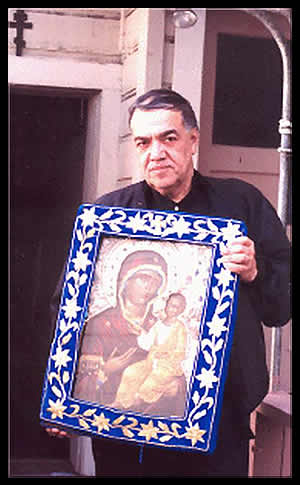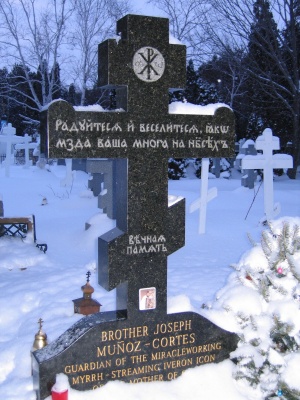José Muñoz-Cortes
José Muñoz-Cortes (1950, Chile - 1997, Greece) was a Chilean convert to Orthodox Christianity who became interested in monasticism, and became the guardian of the miracle-working myrrh-streaming Iveron Icon of the Mother of God (Montreal Icon). He was murdered on October 31, 1997, in his hotel room in Athens, Greece.
Contents
Life
Brother José was born in Chile into a pious Roman Catholic family of Spanish descent. He was a boy of twelve when became acquainted with Archbishop Leonty of Chile and under his influence José was baptized into the Russian Orthodox Church two years later, with his mother's consent. He began to lead a monastic life as best he could within the confines of the world, although he did not enter a monastery. Later he moved to Canada and continued to observe this way of life.
A talented artist, he secured a job teaching art at the University of Montreal, and began studying iconography.
In the summer of 1982, Brother José went to Mount Athos with a particular interest in visiting some sketes and monasteries specializing in icon painting. At the small skete of the Nativity of Christ, the abbot, Elder Clement, greeted Brother Jose and his travelling companion warmly and offered traditional Athonite hospitality. He then took them to see the skete's icon studio.
Brother José felt an immediate and strong attraction to an icon of the Mother of God, a contemporary (1981) copy of the ancient and revered Iveron Icon. It was one of the first icons which had been painted at this skete, by one Fr. Chrysostomos in 1981. He was disappointed to learn that it was not for sale, but to his great joy, as he was leaving the skete, Abbot Clement, unexpectedly chased after him handing him the Icon, saying that it pleased the Mother of God to go with him to North America.
Back in Montreal, Brother José began reading an akathist daily before the Icon. A few weeks later, on November 24, he awoke and smelled a strong fragrance. The new Icon was streaked with myrrh, miraculously emanating from the hands and stars of the Mother of God.
Soon thereafter, It was recognized by the Russian Orthodox Church Abroad, and given the blessing to travel to churches and monasteries for the edification of the Christian faithful.
During the next fifteen years, as myrrh continued to flow from the holy Icon, Brother José devoted himself to Her care, accompanying the holy Icon on numerous trips to parishes all over the United States, Canada, South America, Australia, and Europe. In Bulgaria, over sixty thousand people came to venerate the Icon at one particular church in Sofia.
Brother José was also extremely faithful in fulfilling the countless requests for prayers that he received, daily, commemorating thousands of names, among whom were several dozen godchildren.
Death
Jose was tortured and brutally murdered in a hotel room in Athens, Greece on the night of October 31, 1997, by several individuals.
He had planned to return to Canada the following day to celebrate the fifteenth anniversary of the appearance of the miraculous appearance of myrrh on the Icon. The case is still unsolved, though several individuals were suspected in the crime.
The Myrrh-Streaming Montreal Icon disappeared following Brother José's murder, and has not been seen since.
Brother José has not been glorified a saint by the Church, though many miracles have reportedly taken place in his name, including icons of Brother José himself that have begun giving myrrh.citation needed
One such miraculous connection is the newly-revealed and miracle-working Hawaiian Myrrh-streaming Iveron Icon of the Theotokos, which began giving myrrh shortly before the 10th anniversary of Brother José's martyrdom. The Hawaiian Icon is a printed copy of the Montreal Icon. Other copies of the Montreal Icon have also given myrrh at various times.
See also
External links
- José Munoz-Cortez (1950-1997): The Chosen One of the Mother of God.
- "Montreal" Myrrh-Streaming Iveron Icon.
- The Hawaiian Myrrh-Streaming Iveron Icon of the Theotokos ("Gavaiskaya"), Honolulu Hawaii .
- Remembering Brother Joseph, Martyred Curator of the Iveron Icon (Autopsy).
- Miracle of the Myrrh Streaming Icon. YouTube video of the myrrh streaming Iveron Icon of the Holy Theotokos in Hawaii.
Sources
- Brother José Muñoz-Cortes at Wikipedia.
- The Biography of a Martyr. Orthodox America.
- Brother Jose Munoz-Cortez, Reflections at the Funeral. Orthodox America.
- The Myrrh-Streaming Icon of the Mother of God of Iveron.

